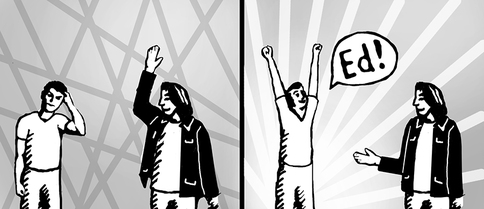
In my personal mythology of punctuation, Semicolon is a sweet, shy underdog, often misunderstood and maligned but heroic in his own way. He lives in his humble hut, gentle and introspective but always alert to passing sentences that have become confusing tangles of list items and related clauses. Semicolon brings words together in the most graceful way and asks for nothing in return.
I don't know why our poor Semicolon is so misunderstood. Maybe it's because he sometimes gets used in sentences that are long and winding and difficult. But don't worry. I'm here to offer a brief (and simple!) guide to the use of this lovely punctuation mark.
CONNECTION
You have two independent clauses (complete sentences) that are closely related. They're so closely related that using a period between them would be just a touch too much interruption. Well, use a semicolon instead!
These pears are too ripe for me; I like my pears crunchy.
The sun is shining; spring has arrived.
COMPLEX LISTS
You have a list of three or more items. At least one item in the list contains commas. To avoid confusion, separate the list items with semicolons (you can think of it as if the higher-level commas are "graduating" and need a little hat on them).
They asked for apple juice, orange juice, and lemonade; blankets and pillows; and the Netflix password.
There is one last commonly accepted way to use a semicolon: When a sentence has a whole lotta commas and the meaning might get confusing, a comma might be graduated to a semicolon for clarity. You'll see it a lot more often in older literature. But please, unless you have mastered the use of the semicolon, pretend this last way to use it does not exist. I have a theory that it's what causes most people's confusion.
And that's it! Semicolon wants to help. Let him.
I don't know why our poor Semicolon is so misunderstood. Maybe it's because he sometimes gets used in sentences that are long and winding and difficult. But don't worry. I'm here to offer a brief (and simple!) guide to the use of this lovely punctuation mark.
CONNECTION
You have two independent clauses (complete sentences) that are closely related. They're so closely related that using a period between them would be just a touch too much interruption. Well, use a semicolon instead!
These pears are too ripe for me; I like my pears crunchy.
The sun is shining; spring has arrived.
COMPLEX LISTS
You have a list of three or more items. At least one item in the list contains commas. To avoid confusion, separate the list items with semicolons (you can think of it as if the higher-level commas are "graduating" and need a little hat on them).
They asked for apple juice, orange juice, and lemonade; blankets and pillows; and the Netflix password.
There is one last commonly accepted way to use a semicolon: When a sentence has a whole lotta commas and the meaning might get confusing, a comma might be graduated to a semicolon for clarity. You'll see it a lot more often in older literature. But please, unless you have mastered the use of the semicolon, pretend this last way to use it does not exist. I have a theory that it's what causes most people's confusion.
And that's it! Semicolon wants to help. Let him.

 RSS Feed
RSS Feed